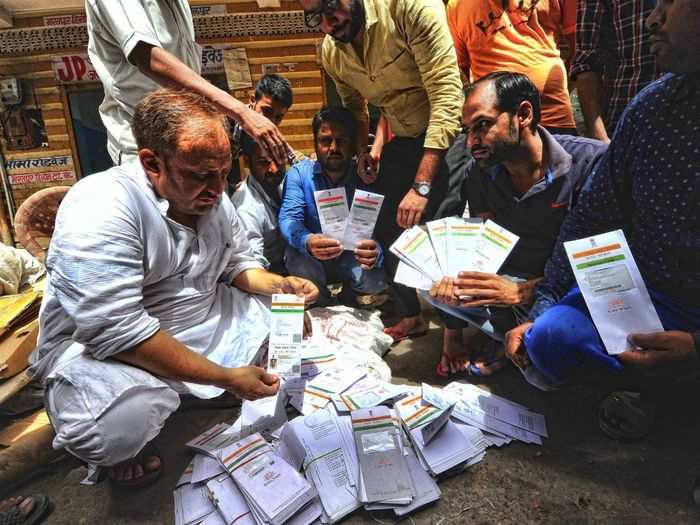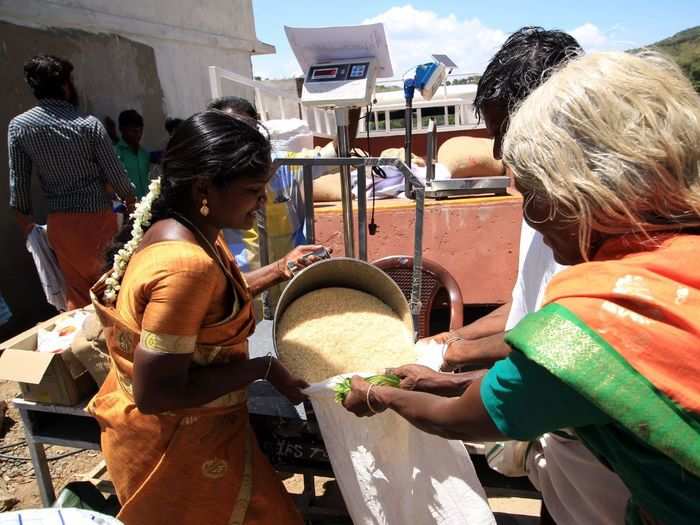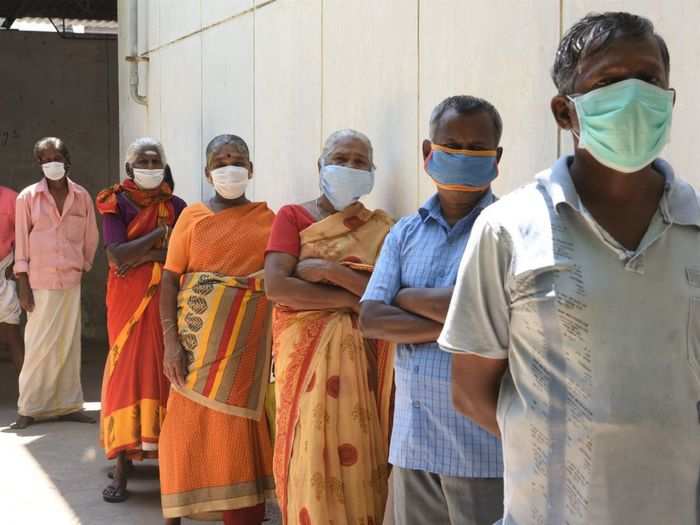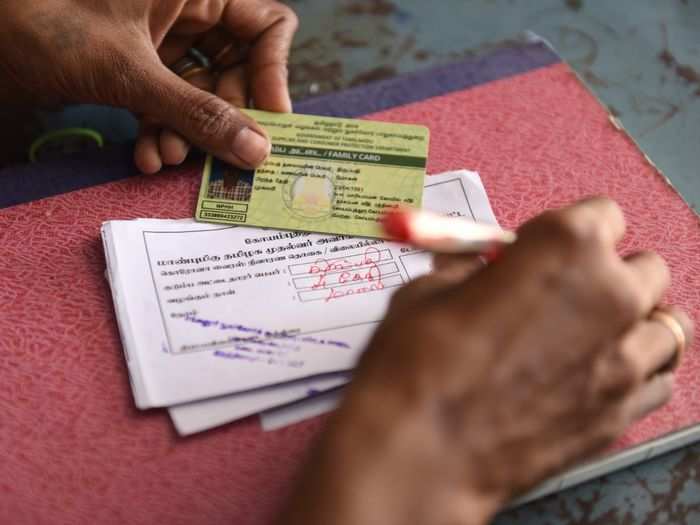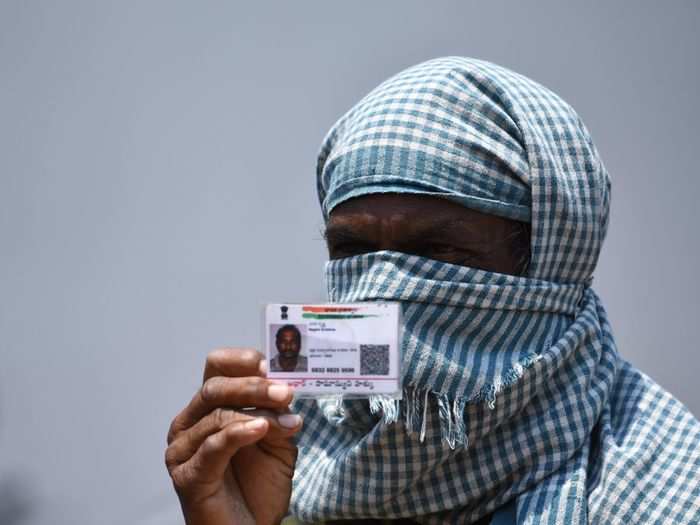Anti-liqour protesting women are pouring the government provided PDS rice citing its inferior quality during the protest against TASMAC in Azhagiripuram in Trichy on April 8 amid the coronavirus lockdown BCCL
- Indian Finance Minister Nirmala Sitharaman promised that the ‘One Nation, One Ration Card’ scheme will reach 100% coverage by March 2021.
- The use of Aadhaar cards was flagged as being a risk for central government employees.
- The portability of the public distribution system (PDS) should allow families to procure essential food supplies even if families are located in different states. However, experts point out that there are several obstacles.
India’s biometric identification system, Aadhaar, is no stranger to controversy. Now, the government wants to expand its coverage to ensure 100% coverage under its food security public distribution system (PDS) portability scheme — ‘One Nation, One Ration Card’.
Finance Minister Nirmala Sitharaman said that the portability of the PDS system will also allow families to procure pulses and food grains even if members are located in different states.
The Narendra Modi government has promised to roll it out for 83% of the beneficiaries by August 2020 and the remaining by March 2021. However, there are some risks and gaps, which the government and Sitharaman would be aware of and policymakers may have to go on war footing to meet the set deadlines.
Fake Aadhaar cards will be a pain point
Imran, a scrap dealer, found more than 2,000 Aadhaar cards in a sack of old newspapers sold to him in Jalupura area in Jaipur BCCL
Earlier this month, the police found 250 fake Aadhaar cards with the same image in a remote Uttar Pradesh village — Pokhari as per a Hindustan report.
Even though the government has reiterated that the system isn’t susceptible to fraud, India Spend’s report from last year shows that reported incidents are on the rise. Since 2011, there have been 164 Aadhaar-related frauds and nearly half of them — 73 incidents — came to light in 2018.
As recently as February this year, 127 Aadhar cards were deactivated by the Unique Identification Authority of India (UIDAI) in Hyderabad. “Fake Aadhaar number is not issued by UIDAI and hence is not an Aadhaar,” officials told The Hindu stating that, overall, 929 cards have been deactivated since February 2012.
The use of Aadhaar cards to procure essential supplies, at a time when many are facing the risk of starvation, could start a fresh wave of fraudulent Aadhaar-related incidents. “India is still grappling with limited financial, technological literacy — people aren’t sure of what they should or should not share and the authorities have failed to provide that clarity.” researcher Anmol Somanchi told India Spend.
India’s food security program has its own loopholes that need to be dealt with
The tribals of Thoomanur and Sembukkarai, like other villagers, used to get free rice from ration shop ever months. But they were shelling out Rs 100 to 150 each family for transporting the rice and other materials to their settlements from Anaikatty downhill. BCCL
The PDS system, sans its digitalisation, has several gaps. Even Food Ministry officials have acknowledged that there is a “steep learning curve” in ensuring that the availability of food grains matches migration flows.
In addition to ensuring that there’s enough food to go around where it’s actually required, the problems are magnified by the misclassification of the poor as non-poor as vice versa. “Expert studies have shown that PDS suffers from nearly 61% error of exclusion and 25% inclusion of beneficiaries,” said
PRS, a non-profit think tank on Indian Policies.
The risk of contagion was cited for government attendance — the same should hold true for PDS use too
Ration cardholders at Rathinapuri thronged the corporation school in their locality to collect PDS tokens BCCL
“The central government must stop Aadhaar-based biometric authentication (ABBA) immediately because of the risk of transmission. It has already discontinued Aadhaar-based attendance for central government employees on the same grounds,” points out Reetika Khera from the Indian Institute of Management (IIM), Ahmedabad.
Limitations of the ‘One Nation One Ration Card’ system
The office of district supply officer (DSO) distributing tokens to the ration card holders BCCL
Making the world’s largest food security program portable is easier said than done. In order for the ‘One Nation One Ration Card’ system to work, you need uninterrupted connectivity, electronic point-of-sale (ePOS) machines, and operators at ration shops to be familiar with digital solutions.
Rural and remote areas, where the need for PDS is the highest, fall short on all three accounts. “ePoS connectivity remains erratic, jeopardising smooth functioning,” said PRS. The analysis also points out that coverage of ePOS machines at fair price shops is inadequate, with many still using old-school methods like booklets to keep a tally of recipients.
Aadhaar won’t replace ration cards — it will only complement them
A customer brings his aadhaar card outside a wine shop during the ongoing COVID-19 nationwide lockdown BCCL
In most states — like West Bengal, Bihar, and Uttarakhand— where the system has already been implemented, the Aadhaar card hasn’t replaced the ration cards — it’s only complemented it. “Users still need their ration card when they go to the ration shop,” said Silvia Maserio from the London School of Economics (LSE).
The problem is further magnified because the PDS scheme only allows a particular household to buy half of the subsidised grains at a time. “In an effort to prevent one member of the household taking the entire ration for the month it leaves family members in different locations stranded without food,” said PRS.

